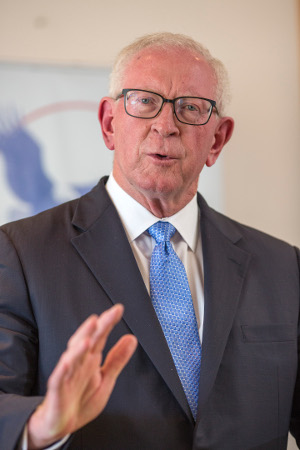 |
Darrel Castle, a U.S. Marine Vietnam veteran, earned a Juris Doctorate from Memphis State University in 1979. Castle opened his own law firm in Memphis in 1984, and has concentrated his practice in the areas of bankruptcy and personal injury.
A former Chairman of the Tennessee Constitution Party, he served as a Vice Chairman of the national party and was the running mate of Chuck Baldwin, the 2008 Constitution Party presidential candidate. In 1998, Mr. Castle and wife Joan founded the Mia’s Children Foundation, a Christian mission in Romania aiding homeless Gypsy children. |
Peter B. Gemma: Thanks much for taking time to answer some questions. At what point in your life did you say to yourself, “I’ve got to get involved.” How did that lead up to your decision to run for president?
Darrell Castle: I got started working in the political system in 1992 when I was introduced to Howard Phillips and I was able to join Howard in helping to form and found the Constitution Party. I’ve served in the Constitution Party for almost 25 years and have held many different positions including as the 2008 Vice Presidential candidate. The members of the Party drafted me as their candidate this year.
Why am I running? I believe that the entire system of law and justice is under attack as well as the rule of law itself. This is a very dangerous time for America – we can continue to reject our foundation or we can pull back from the brink. All we have to lose is everything.
Gemma: You have stated that, “two of the first things on my agenda would be getting the United States out of the United Nations and ending the Federal Reserve.” Why those issues? How would you go about accomplishing this?
Castle: I want to see the United States as a free and independent nation once again. Membership in the United Nations is incompatible with that goal because its very nature is one of control by bureaucrats unaccountable to the American people. UN Membership is incompatible with the American way of life too – with a Constitutional Republic and the foundational principles that have made this the greatest country offering the most freedom and the most prosperity to the most people in history. Instead, the United Nations is about population control, control of economies through what it calls climate change, control of nations through Agenda 21 sustainable development policies.
I would have to end our membership through education of Congress and the American people and through withholding of funds and non-participation.
As far as the Federal Reserve, it has controlled the American monetary system for 103 years. Its initial stated goals were protection of the dollar’s value and full employment, but both are abject failures with the dollar having lost 98 percent of its value. The Fed has flooded the world with credit and debt to the point where the inevitable fall is going to be terrible. The Fed’s credit expansion explains much of the mischief engaged in by the United States government in the last few years. Unlimited budgets do that to people. Right now, the Fed is engaged in destroying the futures of retirees and other savers with zero and soon to be negative interest rates. That destruction will create more and more dependent people.
Ending it would require the same concerted effort as for the UN, but what a glorious way to spend the next four years.
Gemma: You have been quoted as saying the U.S. will have a much lower standard of living 25 years from now. Why?
Castle: How could a nation with almost 20 trillion dollars of current debt not have a lower standard of living in 25 years? The debt is growing daily and within 25 years will have interest payments that’ll eat most or all of the budget. That’s just the on-budget debt and it doesn’t include the more that 100 trillion dollars in mandates like Social Security, Medicare, etc. This debt is un-payable and dealing with it is going to reduce our standard of living, so no one will deal with it until it is much worse.
If that were all, it would be plenty but it gets worse – changing demographics indicate a rapidly aging population with fewer and fewer young workers to support them. We have aborted too many and indebted too many and that will have to be atoned for.
One more thing: foreign entanglements will continue to require higher and higher defense expenditures so the situation will get worse at least that’s the way I see it.
Gemma: Part of your platform is opposition to something called Agenda 21. What is that, and why do you oppose it?
Castle: Agenda 21 is a United Nations initiative that is built on the premise that man is destroying the earth and so human economic activity must be greatly reduced. In effect, it is civilization in reverse or the “de-industrial revolution.”
I oppose it because the number one priority of Agenda 21 is climate change policy – they believe that human economic activity is causing the climate to change with catastrophic results for mankind. Also, they fear over-population and think killing off the earth’s population can reverse it. And they believe in the destruction of the free market because it is evil, corrupt, and only serves the rich nations – they want to enact a world socialist system.
And two more critical issues come to mind: first, cheap energy is their enemy because it allows prosperity and expanding human activity across all economic classes. In other words, it is uplifting the masses. Finally, they advocate world-controlled education such as common core. They want to propagandize the children of the world to believe all the nonsense I just mentioned so they can be good workers on the global plantation.
Why would anyone oppose all that?
Gemma: The Constitution Party platform states, “We are opposed to the flat-rate tax, national sales tax, and value added tax proposals that are being promoted as an improvement to the current tax system.” Granted you advocate a government greatly reduced in size and scope, but where will federal revenues come from instead of these tax reform proposals?
Castle: I have proposed a taxing system whereby taxes would be apportioned to the states as the census dictates. If my state of Tennessee had two percent of the nation’s population, for example, it would be liable for two percent of the budget. It would be incumbent upon the representatives from Tennessee to help hold down Federal spending. The Federal Government would be encouraged to spend less not more. The states would be empowered and Washington would be dis-empowered. Washington’s hold over the states would be broken and the states would be sovereign again – Washington would have to ask the states for money. States would be free to collect their revenue as they see fit. Alaska might tax its natural resources and Florida might tax tourism. In Nevada, it would obviously be gambling. Since people could keep their income the economy would explode with growth.
Gemma: Are press reports of you favoring decriminalizing marijuana accurate?
Castle: I favor the de-criminalization of marijuana as both a liberty and a moral issue. It is immoral in my view to take people’s liberty because they possess this substance. This would free the police, the police budgets, and create much space in our prisons.
Gemma: Why are you in favor of granting convicted felons the right to vote?
Castle: I favor examining the crimes for which a person is convicted before depriving him of the voting privilege for life. We have thousands of crimes on our books and not all of them are harmful enough to end voting privileges.
Gemma: You’ve stated that, “I would not be in favor of granting asylum to those here illegally but neither would I deport them wholesale.” Also, you agree with Donald Trump’s idea of banning all Muslims from emigrating to the U.S. What are the specifics of your position on illegal immigration?
Castle: We should secure our borders by any means necessary then examine who gets into this country by way of immigration. We can’t continue to have completely open borders and a stable country at the same time so we must know who is coming in. I do not favor asylum for those here illegally nor do I favor a path to citizenship. Welfare or entitlement programs, if you choose to call them that, should be strictly for American citizens. I have said that I would nor deport wholesale but I would not hesitate individually if the need arose.
For now it seems we have reached our capacity to absorb the Muslim population of the Middle East. I read that between one and two percent of the population of Somalia now lives in America.
Gemma: On July 2nd, you were quoted at LibertyHangout.org, as saying, “Libertarians should support me because I am more Libertarian than the two candidates of that Party,” but later you stated, “I’ve never said I was more Libertarian than Gary Johnson.” Will you clarify that?
Castle: People often quote me as saying that I am more Libertarian than Gary Johnson but it was not me who said that. My supporters listen to my interviews, draw conclusions, and create memes, and sometimes these memes are attributed to me. However, I will say that some of Mr. Johnson’s positions especially the one concerning religious freedom are not in keeping with traditional Libertarian thought. If I wanted to be a completely Libertarian person I would join that party instead of the Constitution Party.
Gemma: In response to the Supreme Court ruling on same sex marriage, the Constitution Party released a statement equating the opinion to the Dred Scott slavery decision. Is that your position? Also, you have said that you are opposed to legalizing same-sex marriage because “marriage with any definition other than the Biblical standard” is unacceptable. Isn’t that imposing one religious standard on all U.S. citizens?
Castle: I’m afraid you may have misunderstood me. I am unfamiliar with any comparison of same sex marriage and the Dred Scott case. I have often compared the holding in that case to the Supreme Court’s holding that unborn babies are not “persons” and therefore do not qualify for Fifth Amendment protection.
As for same sex marriage, I have said that I do not believe in it or that it even exists. If I were President and two members of the same sex came to me and said we’re married and here’s a priest, a minister, and a civil magistrate who will attest to that, I would say you are not married because God defines marriage quite clearly in his holy word and you do not meet that definition. However, as President it is irrelevant to me because your relationship is none of my business. It is an abuse of political power to require people to buy a license from the government for permission to engage in whatever relationship they choose. Since there would be no governmental financial advantage to this relationship it is not a governmental concern.
Gemma: The Constitution Party asserts in its platform that obscenity laws must be “vigorously enforced” because, “local, state, and federal governments [should] uphold our First Amendment right to free speech.” Using the free speech as a basis for limiting or banning the use of pornography seems contradictory. Is there a religious factor involved in that stance?
Castle: Of course there’s a religious factor involved in that stance. There’s a religious factor in all laws carrying criminal sanctions. I am not in favor of the Federal Government stepping into this role. I favor limiting government to its delegated, enumerated Article 1 Section 8 powers. The other powers existing are to the states and the people. If the states want to sanction it then that should be their prerogative. I see a role in Federal prosecution of child pornography under the 5th and 14th Amendments. Child pornography should be severely sanctioned since it is akin to rape, or enslavement of those innocent and unable to defend themselves.
Gemma: You have said, “I fear for the future, because our country is under the judgment of God for the 60 million unborn babies we have allowed to be killed.” How will making abortion illegal turn this nation toward God?
Castle: God has said that if we humble ourselves, seek his face, and turn from our wicked ways he would hear our cry and heal our land. What could be more clear?
Gemma: How many state ballots will your name appear?
Castle: My name will appear on the ballot in 25 states. In addition, 21 other states have me registered as a write-in candidate. So, Americans in 46 states are able to vote for me. There is also a chance that we will get Nebraska and the District of Columbia which would bring us to 47 – plus D.C.
Gemma: Apparently West Virginia has removed your name from the ballot. Will you explain what’s going on there?
Castle: Yes, due to a West Virginia Supreme Court ruling, the state removed us from the ballot. We filed an emergency lawsuit – we won – and we are back on the ballot. Our victory even made front page in some of the West Virginia newspapers.
Gemma: Tell me about your running mate, Scott Bradley of Utah.
Castle: I have known Scott for at least 20 years and include him among my dearest friends. He is a well-known Constitutional expert and lectures around the country on the Constitution and other founding documents. I also consider him to be an expert in the Federal seizure of state lands especially in the West, and since I want to reverse those seizures I need him to help me do that. Scott is also of the highest character and a true gentleman.
Gemma: Finally, if you were addressing a conservative Republican, what would you say to get him to switch his vote from Trump to the Constitution Party? How would you convince a Libertarian Party supporter to vote for the Castle-Bradley ticket?
Castle: I would tell both the same thing. If you think government should be limited choose me. If you think we should have unlimited government any of the others will do. If you value life choose me, but if you don’t any of the others will do. If you favor constant foreign intervention any of the others will do but if you do not, choose me. If you want to be free to control your children’s education choose me, if you want the government to control it any of the others will do. If you want to keep all your income choose me but if you want to give large portions of it to the government any of the others will do.

